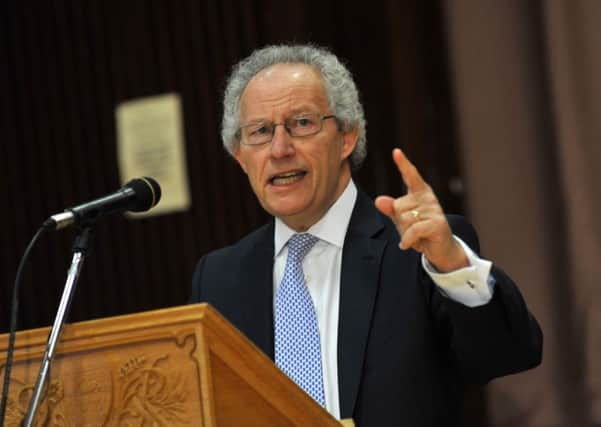McLeish says timetable for devolution is ‘ludicrous’


He said the rushed process of cross-party talks and limited consultation was “turning our backs” on the success of the referendum with its unprecedented 85 per cent turn-out.
Chairing a conference yesterday at Our Dynamic Earth, in Holyrood, on “What next for Scotland?”, Mr McLeish hit out at the constrained timescale set by the UK government for the new devolution commission under Lord Smith of Kelvin.
Advertisement
Hide AdAdvertisement
Hide AdHe has been asked to produce agreed recommendations on new powers for Holyrood by November 30, paving the way for draft legislation by January 25.
Mr McLeish said: “It seems to me the timescale is absolutely ludicrous.
“We are turning our backs on the best example of civic engagement that’s ever been seen in British politics, turning out backs on Scots getting involved in an issue dear to their hearts.
“If it had been independence we would have been away, but because it’s another form of devolution it’s back to Westminster and business as usual.
“I think Lord Smith needs to accept he has been given a difficult task by the Prime Minister – but if he is serious about carrying on the legacy of September 18 what he must do is involve civic Scotland in every aspect – trade unions, the business community, all parties.
“At this point it’s simply not happening and the timescale is ludicrous to make it happen.”
At the same conference, Professor Michael Keating, director of the Scottish Centre on Constitutional Change, based at Edinburgh University, also voiced concern about the Smith commission process, which was launched following the referendum to seek a unified set of proposals from Labour, the Conservatives and Liberal Democrats after all three signed up to a “vow” on more powers.
Prof Keating said: “What we got during the referendum campaign was an intervention by three unionist parties, after 20 per cent of people had already cast their vote, telling them they had changed the meaning of No.
Advertisement
Hide AdAdvertisement
Hide Ad“Now it means devolving more powers, we can’t tell you what those powers are because we haven’t decided yet, you won’t get to vote on them in the referendum because we don’t know what they are and you won’t get to vote on them in the UK election because it will be too late’.
“It is a party fix. That’s the old kind of politics that we thought we were getting away from during the referendum campaign.
“The process should take longer, all the parties should be involved, civic society should be involved and we should be given time to think about the implications and then agree on what the next stage should be.”